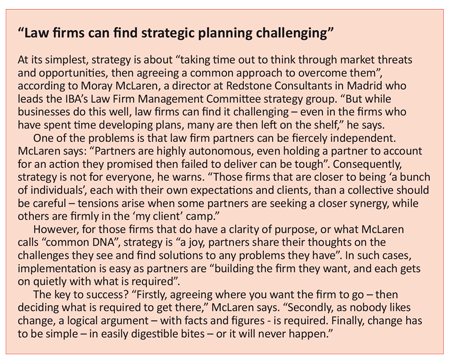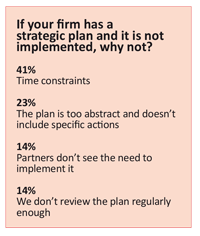Planning for success
Most partners agree that law firms can prosper by drawing up strategic plans, so why aren’t all firms adopting them?
There is almost universal agreement among partners at law firms in Iberia that law firms can only benefit from having a strategic plan. For the uninitiated, a strategic plan is a written document that sets forth where an organisation wants to go and the specific steps it will take to get there – such plans usually cover a three to five-year period. Essentially, this helps law firms agree a course of action to enable them to overcome the challenges their practice faces and identify opportunities for growth. However, though nearly all partners believe their firm should have a strategic plan, a new study by Iberian Lawyer suggests that law firms’ adoption of strategic plans is not as common as partners would hope.
While 92 per cent of partners in Spain and Portugal say they believe their firm should have a strategic plan, only 61 per cent of respondents to our survey said their firm actually has one. Furthermore, less than half (48 per cent) of those who say their firm has a strategic plan believe the firm is very successful in implementing it in the sense that the strategy “guides our actions, and our lawyers are reviewed and rewarded based on our ability to achieve the goals of the plan”. Fifty per cent of partners who say their firm has a strategic plan say the firm is only “partly successful” in implementing it and that the extent to which it is utilised is limited to it being reviewed and discussed “throughout the year”.
Too little time?
Of the respondents who gave a reason for their firm’s strategic plan not being implemented, 41 per cent cited “time constraints”, while around one in four respondents (23 per cent) said it was not properly adopted because it was “too abstract and doesn’t include specific actions”.  Meanwhile, 14 per cent of respondents who provided a reason for their firm’s strategic plan not being properly adopted said it was because partners “don´t see the need to implement it”. A similar proportion said their firm’s plan was not implemented because it was not reviewed regularly enough. One partner in Spain hinted at internal tensions between lawyers and the leadership at their firm when they said its strategic plan was not implemented because “our senior partner decides our strategy”.
Meanwhile, 14 per cent of respondents who provided a reason for their firm’s strategic plan not being properly adopted said it was because partners “don´t see the need to implement it”. A similar proportion said their firm’s plan was not implemented because it was not reviewed regularly enough. One partner in Spain hinted at internal tensions between lawyers and the leadership at their firm when they said its strategic plan was not implemented because “our senior partner decides our strategy”.
What themes or issues should strategic plans cover? Talent acquisition and retention appear to be key concerns of partners in Spain and Portugal – 85 per cent of all respondents said strategic plans should address these issues. However, of the respondents working at firms that did have strategic plans, only 77 per cent said their firm’s plan actually did cover talent acquisition and retention. The second most important issue that strategic plans should deal with is client relationship management – three out of four (75 per cent) of participants in the study said strategic plans should cover this topic. Yet, only 59 per cent of respondents working at firms that have strategic plans said their firm’s plan tackled the issue of client relationship management.
Measuring client satisfaction
Other areas where there seems to be a disconnect between what partners believe strategic plans should cover and what such plans actually do cover included measuring client satisfaction, improving billing and collections, and succession planning. A total of 47 per cent of all respondents said strategic plans should include provision for measuring client satisfaction, but only 40 per cent of partners at firms with a strategic plan said the plan covered this issue. A total of 42 per cent of participants in the study said strategic plans should aim to improve billing and collections, but only 32 per cent of partners at firms that have strategic plans said their firm’s plan tackled these problems. Meanwhile, one in three (33 per cent) survey respondents said law firm strategic plans should address the issue of succession planning, but of the participants who said their firm had a strategic plan, only 19 per cent said their firm’s plan dealt with this issue.
Who is responsible for developing strategic plans at law firms? A total of 71 per cent of partners said all of the firm’s partners had input into the development of the plan, while 27 per cent said “non-lawyer professionals working at the firm” – such as marketing and business development staff – had a say on what should be included in the strategic plan. A total of 22 per cent of survey participants said they engaged external consultants to help with the development of their plan.
 Client feedback
Client feedback
One common theme that emerges is the need for law firms to place a bigger emphasis on input from external parties when developing strategic plans. A massive 83 per cent of respondents said client feedback should be considered when developing strategic plans, but of respondents who said their firm did have a strategic plan, only 57 per cent said client feedback was used when creating the plan. Similarly, while 72 per cent of all respondents said “industry reports and business intelligence” should be used to develop strategic plans, only 59 per cent of survey participants at firms that do have a strategic plan said such information was considered when devising the plan. In a similar vein, 36 per cent of all respondents to the survey said external financial advisers should be consulted when developing strategic plans, but only 23 per cent of study participants at firms that do have plans said external financial advisers were consulted when creating the plan. 
The majority of partners (58 per cent) at firms that have a strategic plan said they used external consultants when developing the document. Meanwhile, more than one in four (28 per cent) said they had not used external consultants to develop their plan, but would consider doing so in future. Only 14 per cent said they would never use external consultants when developing their strategic plan.
Indeed, a lack of expertise in formulating strategic plans among lawyers was seen as a major obstacle to their introduction in law firms – this was cited by 43 per cent of respondents. Meanwhile, 46 per cent of respondents said getting partners to buy into the concept of a strategic plan was a major barrier in the sense that “partners see no purpose” in having such a plan. Achieving consensus was also seen as an obstacle by 39 per cent of study participants, while 9 per cent said one of the major barriers was the fact that “we have no way of holding colleagues accountable for their performance in accordance with the plan”. 












